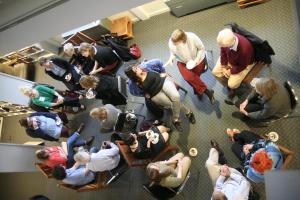Also of Note
 “I am fascinated by the algebraic structures on elliptic curves, especially elliptic curves defined over fields of finite characteristics,” says Ziyue “Zoey” Guo (pictured right), and there are few who could argue with her. Marlboro’s mathematics fellow for the academic year, Zoey completed her doctorate in mathematics in 2015, at Northwestern University, with a dissertation on Abelian graphs. “In particular, I look at the behavior in the Perron-Frobenius eigenvalues when a finite graph is expanded by adjoining two-valent trees.” She also enjoys playing the piano and viola, as well as rock climbing.
“I am fascinated by the algebraic structures on elliptic curves, especially elliptic curves defined over fields of finite characteristics,” says Ziyue “Zoey” Guo (pictured right), and there are few who could argue with her. Marlboro’s mathematics fellow for the academic year, Zoey completed her doctorate in mathematics in 2015, at Northwestern University, with a dissertation on Abelian graphs. “In particular, I look at the behavior in the Perron-Frobenius eigenvalues when a finite graph is expanded by adjoining two-valent trees.” She also enjoys playing the piano and viola, as well as rock climbing.
“I write short, weird fiction mostly, and I am planning a sci-fi novel but that is in a very preliminary stage,” says junior Derek Tollefson. He is also co-editor-in-chief of a remarkable literary journal called Milkfist, which came out with its debut issue in September 2015. Billed as “a compendium of art and writing for stammering low-lifes who barely know what year it is,” the magazine features work from both established and up-and-coming talents from all over the world.” Go to milkfist.com.
“I hold a special place in my heart for Arabic, as a poetic and beautiful language,” says Marwa Abayed, Marlboro’s Fulbright fellow in Arabic this year, who comes to us from Tunisia. “I believe it has been burdened with the most wrongful image as the language of ‘terrorists’ in the media.” Marwa has an undergraduate degree in English language, civilization, and literature, and has pursued graduate work in cultural studies and translations. She has been an active participant in the community, including performing in the recent production of The Language Archive.
 “Kathy Urffer (pictured right) is the heartbeat of the grad school. Her title is registrar, but she is the driving force behind just about everything that happens here.” So says the entry nominating Kathy to win the first ever Staff Distinguished Service Award. The award is designed to honor Marlboro staff members for their contributions to the lives of one another and in service of the college’s mission. Among other things, Kathy was cited for organizing a group of staff to attend the Vermont Women in Higher Education conference last year.
“Kathy Urffer (pictured right) is the heartbeat of the grad school. Her title is registrar, but she is the driving force behind just about everything that happens here.” So says the entry nominating Kathy to win the first ever Staff Distinguished Service Award. The award is designed to honor Marlboro staff members for their contributions to the lives of one another and in service of the college’s mission. Among other things, Kathy was cited for organizing a group of staff to attend the Vermont Women in Higher Education conference last year.
Last year, senior Colin Leon joined his cousin Gray Davidson and a team of other sculptors to construct The Dancing Serpent, a 14-foot-long sculptural metal mobile inspired by some of the kinetic sculptures Colin included in his Plan show. The serpent-mobile was built to exhibit at Burning Man 2015, the annual festival of counterculture and pyrotechnics in Nevada’s Black Rock Desert, where it gained many admirers. “Gray received a small grant from Burning Man to complete the piece and was in charge of the aesthetic decisions and the organization of the project,” said Colin. “I was his engineer, consultant, and ‘chief’ welder.” See the sculpture.
“I have become accustomed to using a wide variety of language-learning resources, and to tailoring teaching strategies to suit individual learning styles,” says Ella Grunberger-Kirsh, this year’s Oxford Classics Fellow. Ella earned her master’s in classics from Exeter College with a dissertation on “Cultural politics and poetic voice in the work of Ausonius of Bordeaux,” which won Oxford’s top classics research prize. She has won several other awards and scholarships for her work, and is founder of the Oxford University Classics Society.
Mountain Mystery
 New students Sam Bunker ’18 and Merritt Meehan ’18 investigated a mysterious clue during the Bridges orientation trip titled Haunted Treasure Hunt 2K15. Photo by Connor Lancaster ’16
New students Sam Bunker ’18 and Merritt Meehan ’18 investigated a mysterious clue during the Bridges orientation trip titled Haunted Treasure Hunt 2K15. Photo by Connor Lancaster ’16
Calling All Scholars
 Marlboro gained national attention when National Public Radio’s Amy Scott did a story on the college’s Renaissance Scholars Program.
Marlboro gained national attention when National Public Radio’s Amy Scott did a story on the college’s Renaissance Scholars Program.
Circle Up
 Students, faculty, and staff shared their ideas for Marlboro’s future during a “meet the trustees” event in November.
Students, faculty, and staff shared their ideas for Marlboro’s future during a “meet the trustees” event in November.
Gift Horse
 Students made a casting of a horse’s head from the pediment of the Parthenon in a workshop taught by sculpture professor Tim Segar, using a mold made by sculptor William Tucker.
Students made a casting of a horse’s head from the pediment of the Parthenon in a workshop taught by sculpture professor Tim Segar, using a mold made by sculptor William Tucker.
Gimme Shelter
 Carpenters Don Caponcelli and Brent Johnson close in the roof of the new gazebo near the center of campus.
Carpenters Don Caponcelli and Brent Johnson close in the roof of the new gazebo near the center of campus.
